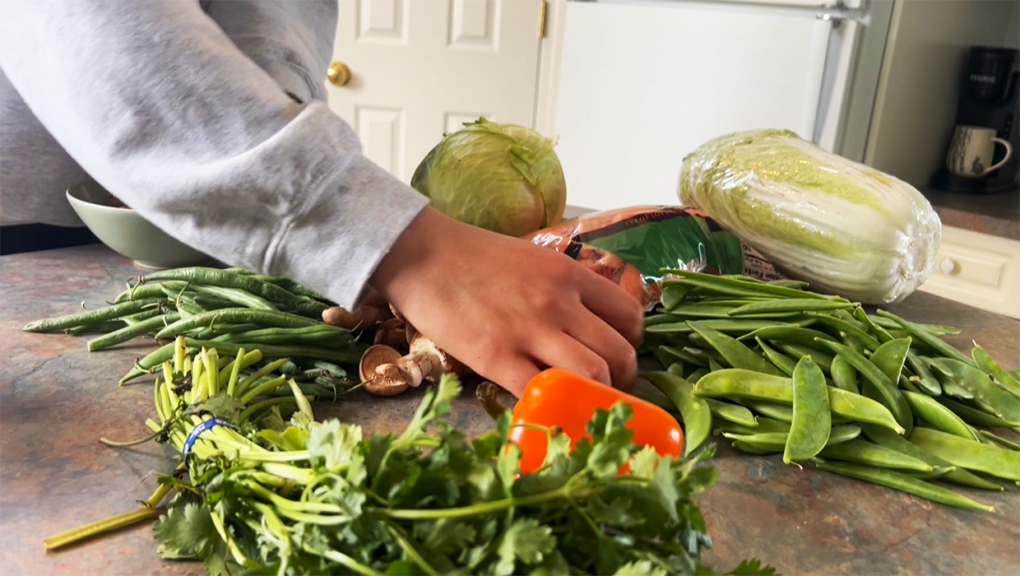Peculiar produce helping cut grocery bills, amid challenges to healthy eating
More Calgarians are finding ways to chop grocery bills and cut back on food waste by using apps, including one focussed on odd-looking fruits and veggies.
Peko is a food recovery program offering mystery bags of “peculiar” and surplus groceries at up to 40 per cent off retail prices, which recently started serving Calgary.
“It gets delivered to your house and it’s so cost effective and the marketing for the peculiar vegetables really, really caught my eye,” said Mount Royal University student Caitlin Zorn.
Curvy cucumbers, three pronged carrots or bruised bananas are just some examples of produce that might not meet grocery store standards and will be rejected by supermarkets.
Peko was started in 2021 in Vancouver by two university students to fight food waste.
“With imperfect food and surplus fruit a lot of times there isn’t quite an established market for them to go to, so a lot of times that will be thrown out, and that’s how the savings part came along,” said Sang Le, one of the two students who founded Peko in Vancouver in 2021.
 Peko is a food recovery program offering mystery bags of “peculiar” and surplus groceries at up to 40 per cent off retail prices, which recently started serving Calgary.
Peko is a food recovery program offering mystery bags of “peculiar” and surplus groceries at up to 40 per cent off retail prices, which recently started serving Calgary.
Those items deemed “imperfect” are perfectly good to eat and can be sold to bulk buyers at a discount.
“On the lowest week, we see at least maybe 10 per cent in savings,” she said, “(while) on the higher weeks, we have gone past 40 sometimes.
TROUBLING TREND
Canadians are actually spending less at grocery stores according to Dalhousie University’s Agri-Food Analytics Lab, but data indicates a troubling trend.
“I don’t think Canadians are buying less, they’re spending less,” explained Sylvain Charlebois of the Lab.
“They’re likely focusing on calorie-rich, nutritionally-poor food products, unfortunately.”
About 18 per cent of all retail dollars are devoted to food, compared to 21 per cent in 2017, and it’s not just food inflation but the overall high cost of living which seems to be to blame.
Charlebois said when faced with soaring rent prices and debt payments, the easiest fix in someone’s budget is often “trading-down on food”
“It’s a struggle for a lot of Canadians,” he said, “especially in the last couple of months.”
He said based on Canada’s Food Price Report 2024, the amount of money needed to support a healthy diet is $339 a month, but the average Canadian is spending about $248.
Before July 2021 Canadians were spending more on average than the desired budget to eat healthy, but since then it seems to have been a challenge.
The high cost of living was a driving factor for Zorn to try out Peko.
“Groceries were just so expensive,” she said.
She said she gets a weekly box of produce for $30 when she used to spend up to twice that amount on fruits and veggies each week.
Since a lot of items are surplus food due to overstocking, it looks like what you find in a grocery store, but Zorn does enjoy finding the ‘imperfect’ items.
“We will get a peculiar looking bell pepper, some bananas will be brown already but it’s easy to just pop those in the freezer and have those for smoothies or muffins.”
She said the mystery box element has given her inspiration in the kitchen too.
“I open my Peko box every week, usually on FaceTime with my mom, and we kind of make it a challenge for ourselves to come up with recipes on the spot to see what we can make with the food that we’re given, so it’s usually really fun,” she said.
She’s learned to make daikon soup and how to slice a whole pineapple.
Zorn is also thrilled the solution has helped cut down food waste.
Peko’s creators say it has diverted more than 136, 000 kg of food from going to the landfill and saved customers close to $1 million in grocery bills.
The company was recently acquired by FreshPrep but continues to operate as Peko, and now also offers mystery boxes including pantry items as well as produce.
According to Charlebois, almost half of Canadians use food rescue apps.
View original article here Source









